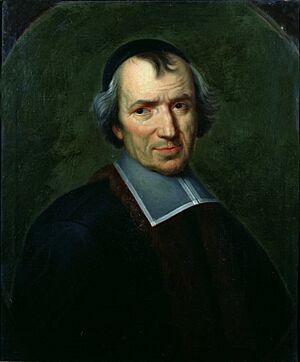Antoine Arnauld facts for kids
Quick facts for kids
Antoine Arnauld
|
|
|---|---|
 |
|
| Born | 6 February 1612 |
| Died | 8 August 1694 (aged 82) |
| Nationality | French |
| Education | University of Paris (Collège de Calvi and Collège de Lisieux) |
| Era | 17th-century philosophy |
| Region | Western philosophy |
| School |
|
|
Main interests
|
Theology, metaphysics, epistemology, theodicy |
Antoine Arnauld (born February 6, 1612 – died August 8, 1694) was an important French thinker. He was a Catholic theologian, a philosopher, and a mathematician. People at the time called him le Grand (the Great) to tell him apart from his father, who was also named Antoine Arnauld. He was a key leader of a group called the Jansenists at Port-Royal.
Contents
Antoine Arnauld's Life Story
Antoine Arnauld was born in Paris, France. He was the youngest of twenty children in the Arnauld family. At first, he was going to become a lawyer. However, he decided to study theology at the Sorbonne university instead.
He was very successful in his studies. His career was going well when he met Jean du Vergier de Hauranne. This person was a spiritual leader at the Port-Royal convent. Arnauld became interested in a religious movement called Jansenism.
Early Writings and Debates
In 1643, Arnauld wrote a book called De la fréquente Communion. This book helped people understand the ideas of the Jansenist movement. It caused some debate because it argued against receiving communion very often.
Later, there was a big argument about a book called Augustinus. The Jesuits, another religious group, said the Jansenists were heretics. Arnauld wrote a book defending the Jansenists. This book helped Blaise Pascal write his famous Provincial Letters. Pascal's letters criticized the Jesuits' moral teachings.
Hiding and Public Life
Arnauld had to hide for a while because of these arguments. In 1655, he wrote two strong letters criticizing the Jesuits. This led to him being officially criticized by the Sorbonne. Pascal wrote his Provincial Letters to help Arnauld during this time.
For over twenty years, Arnauld could not appear openly in Paris. He lived in religious retreat. In 1668, things got better for him. This was thanks to something called the "peace" of Pope Clement IX. King Louis XIV welcomed him, and he was seen as a hero.
Later Years and New Debates
After this, Arnauld worked with Pierre Nicole on a big book. It was against the Calvinist Protestants. The book was called La perpétuité de la foi de l'Église catholique touchant l'eucharistie.
About ten years later, the troubles started again. Arnauld had to leave France and moved to the Netherlands. He eventually settled in Brussels. He spent the last sixteen years of his life there. He was always debating with Jesuits, Calvinists, and other groups.
Arnauld was very energetic. Once, his friend Nicole said he was tired. Arnauld replied, "Tired! when you have all eternity to rest in?"
He was also one of the first to use the ideas of René Descartes, a famous philosopher. Between 1683 and 1685, Arnauld had a long debate with Nicolas Malebranche. They argued about how theology (the study of religion) relates to metaphysics (the study of reality). Most people agreed with Arnauld. When Malebranche said Arnauld misunderstood him, Boileau asked, "My dear sir, whom do you expect to understand you, if M. Arnauld does not?"
Arnauld also wrote many letters to Gottfried Wilhelm Leibniz, another important philosopher. They discussed Leibniz's ideas about metaphysics. Arnauld died in Brussels when he was 82 years old.
His Legacy
Arnauld became well-known for his book L'Art de penser. This book is often called the Port-Royal Logic. It was used as a basic textbook until the 20th century. It is seen as a great example of term logic, which is a way of thinking about arguments.
Some people even called Arnauld the Euclid of the 17th century. Euclid was a famous ancient Greek mathematician. However, Arnauld's desire to win every argument sometimes made him unpopular. He once said, "In spite of myself, my books are seldom very short."
Even with all his achievements, Arnauld is often remembered because of Pascal's famous writings. Pascal's works were easier for the general public to read than Arnauld's more technical essays. A famous epitaph (a short text honoring a dead person) was written for him by Boileau:
“Au pied de cet autel de structure grossière
Gît sans pompe, enfermé dans une vile bière,
Le plus savant mortel qui jamais ait écrit;”
...
(“At the foot of this rough structure altar
Lies without pomp, locked in a vile casket,
The most learned mortal who ever wrote;”)
…
Antoine Arnauld's complete works were published in Paris between 1775 and 1781. There were thirty-seven volumes.
Principal Works
Here are some of Antoine Arnauld's most important books. The links below go to the original French versions on the Gallica website.
- De la fréquente communion où les sentimens des Pères, des papes et des Conciles touchant l'usage des sacremens de pénitence et d'Eucharistie sont fidèlement exposez. (1643) [1]
- Grammaire générale et raisonnée contenant les fondemens de l'art de parler, expliqués d'une manière claire et naturelle. (1754) [2]
- La logique ou l'art de penser contenant outre les règles communes, plusieurs observations nouvelles, propres à former le jugement. (1683) [3]
- La perpétuité de la Foy de l'Eglise catholique touchant l'Eucharist. (1669)
See also
 In Spanish: Antoine Arnauld para niños
In Spanish: Antoine Arnauld para niños
 | Aurelia Browder |
 | Nannie Helen Burroughs |
 | Michelle Alexander |

